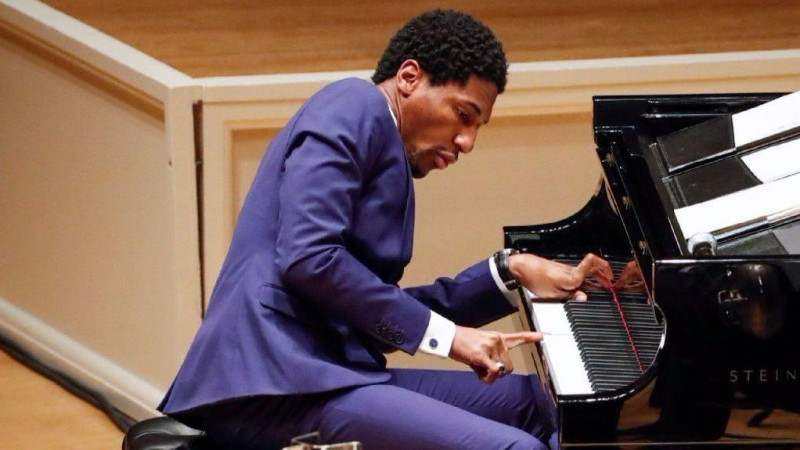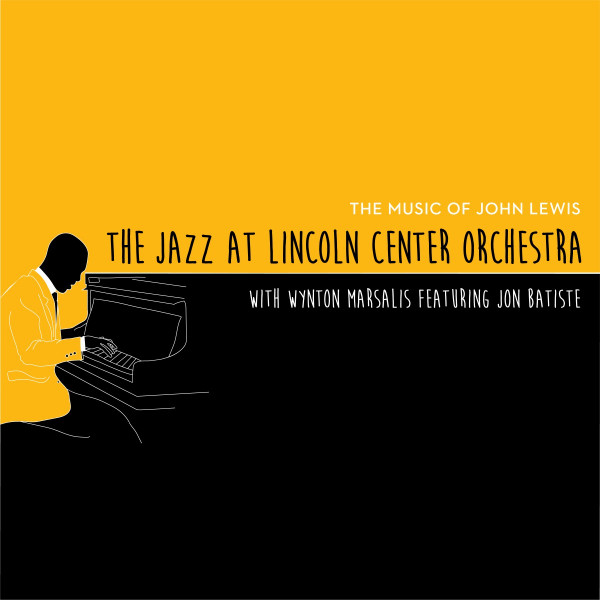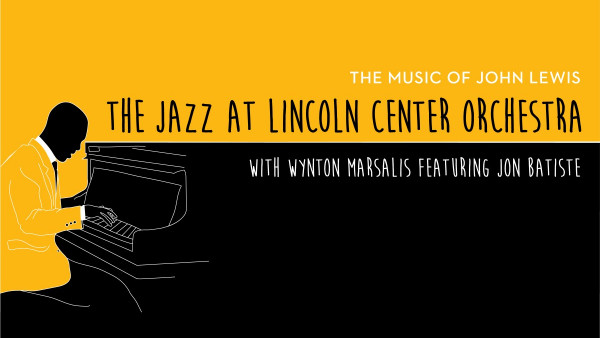Marsalis and JLCO celebrate Morton and Lewis

Pianist Jon Batiste performed with Wynton Marsalis and the Jazz at Lincoln Center Orchestra on Saturday night in Orchestra Hall. (Kamil Krzaczynski / Chicago Tribune)
Let no one doubt that Wynton Marsalis and the Jazz at Lincoln Center Orchestra aim to educate as well as entertain.
That much was inescapable from their residency over the weekend in Orchestra Hall, where Marsalis and friends kicked off Symphony Center’s jazz series with rigorous examinations of the work of two jazz giants.
Surely no performance ensemble has done more to champion music of the first jazz composer — Jelly Roll Morton — than JLCO.
On Friday evening, the ensemble reiterated the point with a program featuring Morton’s music, plus original compositions by JLCO personnel. In effect, the evening spanned the history of jazz composition, from groundbreaking works by Morton — the first to prove that jazz could be written down — to contemporary pieces that would not have been possible without Morton’s breakthroughs.
Marsalis and the orchestra opened with Morton’s “Sidewalk Blues,” a landmark not only for the ingenuity of the composition but also for Morton’s innovative recording of it, complete with spoken word and honking car horns. JLCO alto saxophonist Sherman Irby’s arrangement celebrated the ensemble’s signature robust sound, punctuated by a lusty, plunger-muted trumpet solo from Marsalis.
From this early Morton work, the band leaped ahead to the last, tragic years of the composer’s career. Mostly forgotten by a jazz world he helped invent, Morton composed big-band compositions embracing the swing aesthetic of the late 1930s, but also personalizing it. These last works rarely are performed, but JLCO’s rendition of “Mr. Joe” illuminated why they need to be. The sleekness of Morton’s orchestral writing, the poetry of his themes and the idiosyncrasies of his phrasing show that the man had not run out of ideas, even if the music industry had lost interest in him.
The JLCO’s tonal luster and naturalness of expression suggested that the band should consider making an album of all Morton’s late-period orchestral scores. It could deepen our understanding of Morton’s final years (he died in 1941).
Bassist Carlos Henriquez’s radical re-conception of Morton’s “The Crave” doubled down on Morton’s love of what he called “the Spanish tinge.” This brilliant arrangement included vast sections of dance music, thrilling passages featuring cascading horns and a surging rhythmic energy that held it all together.
Trombonist Chris Crenshaw’s arrangement of “Jelly Roll Blues,” the first published jazz composition (1915), epitomized period style and amplified it, thanks to clarinetist Victor Goines’ trills and other ornate figurations and a high-flying solo from trumpeter Kenny Rampton.
The evening’s non-Morton compositions offered other allures.
Marsalis wrote “Joe’s Concerto” for JLCO baritone saxophonist Joe Temperley, who died last year. The work’s fourth movement conveyed Marsalis’ reverence for Temperley, with JCLO reedist Paul Nedzela taking the solo baritone part. Here was some of Marsalis’ most soulful instrumental writing, Nedzela’s ample vibrato and silken legato lines paying fitting homage to Temperley.
And the fourth movement of Sonny Rollins’ “Freedom Suite,” as arranged by Walter Blanding, cast a spotlight on the band’s throaty reeds and testifying brass. Goines’ blues lament on tenor saxophone was a high point of the evening.
On this program, though, all roads led back to Morton. Among the other highlights: Ted Nash’s exquisitely complex reinvention of Morton’s “Black Bottom Stomp” and Goines’ sensitivity to Crescent City rhythms in his arrangement of Morton’s “New Orleans Blues.” Both reminded listeners of the stature of Morton’s art.
On Saturday evening, the musicians turned their attention to a more recent master, John Lewis. Though best known as pianist and musical director for the Modern Jazz Quartet, Lewis (who died in 2001) was a subtle jazz composer with a singular vision. The elegance, understatement and profundity we associate with his pianism, in other words, radiate from his scores for small and large ensemble.
Jon Batiste, bandleader for “The Late Show with Stephen Colbert,” appeared with Marsalis and JLCO on the recent album “The Music of John Lewis,” and that repertoire dominated this concert.
The buoyant swing sensibility of Lewis’ “Animal Dance” showed his gift for conjuring propulsive rhythmic momentum in a large ensemble; the intricate counterpoint that trombonist Elliot Mason, trumpeter Marcus Printup and alto saxophonist Nash articulated in Lewis’ “Delaunay’s Dilemma” illustrated the composer’s finesse with the intimacies of small-group improvisation.
Lewis’ quasi-classical writing in his suite “The Comedy,” inspired by Italian commedia dell’arte, attested to the man’s erudition, as well as his ability to imbue practically any musical idiom with a compelling jazz aesthetic.
by Howard Reich
Source: Chicago Tribune


